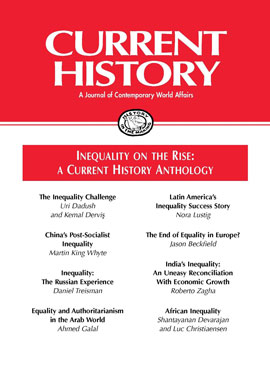Source: Current History
Inequality is stirring controversy in developing and advanced economies. Perceptions of unfair disparities in incomes and opportunities can undermine the legitimacy of both authoritarian and democratic governments. Yet the problem is more complex than many on the right or left care to admit. Once it reaches certain levels, income inequality impedes economic growth; at other times it seems an unavoidable trade-off in the pursuit of growth. Finding the proper balance is more than a question of economic theory; it’s a moral and political dilemma.
The eight essays collected in this e-book appeared in Current History from 2012 to 2013 in a monthly series on inequality around the world. Together they form a useful guide to the topic that benefits from Current History’s region-by-region approach. Contributors include Uri Dadush and Kemal Derviş, who provide a global overview; Martin King Whyte on China; Daniel Treisman on Russia; Ahmed Galal on the Middle East; Nora Lustig on Latin America; Jason Beckfield on Europe; Roberto Zagha on India; and Luc Christiaensen and Shantayanan Devarajan on Africa. As their essays show, each of the world’s regions has struggled with the economics and politics of income distribution. Yet, as Dadush and Derviş note, “There is no secret to the recipes that governments can use to mitigate inequality.” The key ingredient may be political will.
